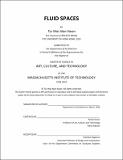Fluid spaces
Author(s)
Kwan, Tsz Wai Alan
DownloadFull printable version (2.839Mb)
Other Contributors
Massachusetts Institute of Technology. Department of Architecture.
Advisor
Renée Green.
Terms of use
Metadata
Show full item recordAbstract
In this thesis, I explore a form of video game that is free from modes of competition and mechanics of puzzle-solving. Instead, this form of video game focuses on creating first-person encounters with evocative spaces that do not urge for actions but allow players to wander, and to daydream. Such encounters do not connect players to other characters or players, but instead, to the depths of their own past. To achieve this goal, I develop a spatial design approach for video game, which aims to create a form of intimacy in 3D virtual environments that induces a state of suspended playing in the players, evoking their memories and bringing them to daydream. This spatial design approach also includes a method for sequencing spaces in video game called the First Person Experiential Model for Spatial Montage, which takes into account the players' moment-by-moment perception as they move between different spaces in the game, and analyze the cumulative psychological effects of spatial order, directionality of the trajectories, and connection devices between spaces such as doors and gates. For testing and demonstrating the principles of this spatial design approach, I create a single-player video game called The Hallway, which places the players into the first-person perspective of a 5-year-old child, who, after being expelled by his father, wanders in the hallway outside his home. By traversing this constantly-evolving hallway, the players not only encounter evocative spaces that give concrete shape to their childhood memories of rejection and insecurity, but also confront spatial paradoxes that allow them to experience the stuckness and anxiety felt by the child.
Description
Thesis: S.M. in Art, Culture, and Technology, Massachusetts Institute of Technology, Department of Architecture, 2016. This electronic version was submitted by the student author. The certified thesis is available in the Institute Archives and Special Collections. "June 2016." Cataloged from student-submitted PDF version of thesis. Includes bibliographical references (pages 91-92).
Date issued
2016Department
Massachusetts Institute of Technology. Department of ArchitecturePublisher
Massachusetts Institute of Technology
Keywords
Architecture.